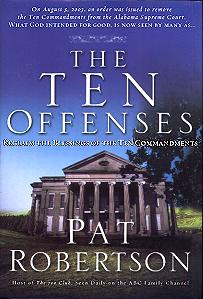EllenWhite.info — The Ellen G. White Information WebsiteDid God send a prophet? |
Return to http://www.ellenwhite.info/sunday_law_demand_a.htm.
|
In examining the plausibility of Ellen White's prediction of a national Sunday law, we first examine a recent book written by a popular evangelical minister.
Pat Robertson: Sunday Laws Should Be a Federal Matter
Besides being a minister, Pat Robertson is also a TV personality, a former U.S. presidential candidate, and the founder of the Christian Coalition, a large grassroots organization that seeks to influence both elections and legislation.
In the wake of the removal of Judge Roy Moore's 10 Commandment monument in Montgomery, Alabama, Pat Robertson published a book in 2004 entitled, The Ten Offenses. In this book he devotes an entire chapter to the question of the Sabbath and Sunday and Sunday laws. Regarding which day is the Sabbath of the fourth commandment, Robertson has this to say:
|
Thus Robertson steadfastly maintains that the Sabbath of the Decalogue is Saturday. One may therefore logically conclude that he, unlike many Christians, believes that the keeping of Sunday instead of Saturday is a violation of the fourth commandment. Yet he goes on to say:
|
Before proceeding any further we must mention three points, for we do not want to be misleading:
- Robertson's citation of Acts 20:7 is in error. If the days begin at sunset, as he just stated, then the meeting of Acts 20:7 occurred on what we now call Saturday night, not Sunday.
- The Bible nowhere tells us that "the early Christians" met "on Sunday rather than on Saturday." Not one Sunday morning worship service is recorded in all the New Testament, and early Christian writings indicate that Christians were still teaching that the Sabbath must be kept centuries after the cross ("Analysis of Common Quotations from The Church 'Fathers' Concerning the Lord's Day").
- Robertson is a Protestant, and Protestantism believes in Sola Scriptura, the idea that Scripture is the final authority, not tradition. It therefore seems a bit contradictory for Robertson to appeal to "custom" rather than Scripture as the authority for substituting Sunday for the Sabbath as a day of rest.
All this is but background for what we read on pages 106 and 107 of Robertson's book:
|
In 1961, the first of several legal battles reached the Supreme Court, challenging the honoring of Sunday as "the Lord's day" and "a day of rest" when businesses were to remain closed. At the time, the Supreme Court ruled in favor of keeping the so-called blue laws intact. But it did so by using a secular line of reasoning, stating that it was within the power of state legislatures to proclaim a weekly day of rest for laborers, and also that it was appropriate for that day of rest to be one that was preferred by the majority of a given state's citizens. |
Remarkable, isn't it? The Supreme Court said that the states can decide to override one of the 10 Commandments! But let's continue:
|
The Court rejected arguments that blue laws violated the consciences of citizens who were compelled by their religion to worship on a Sabbath different than the one established by their state. |
Really? The Supreme Court of the United States of America said that a state can force its citizens to keep another day than the one the 10 Commandments says to keep, and it really doesn't matter if they think their consciences are being violated?
| While it may appear that the U.S. Supreme Court justices were rendering an opinion that favored Judeo-Christian standards, in fact they were astutely sidestepping the issue. Their decision redirected all subsequent cases to the various state supreme courts, and there, of course, the erosion began. Numerous business interests began to lobby their state courts and legislatures to strike down their state's blue laws. |
What was that? Could you repeat that, please?
|
In other words, Sunday enforcement should never have been made a state matter in 1961. It should have been a federal matter. Is Pat Robertson telling us that he would be supportive of national Sunday legislation today?
Robertson's suggestion that Sunday enforcement be a national matter is significant, and leads one to wonder if a situation like the 1880's looms on the horizon, when Ellen White's prediction just might be fulfilled.
|
Copyright © 2004 |
Send comments and questions by going to: /var/www/ellenwhite.info/web/FEEDBACK_EMAIL. |
 AdventWeb |
